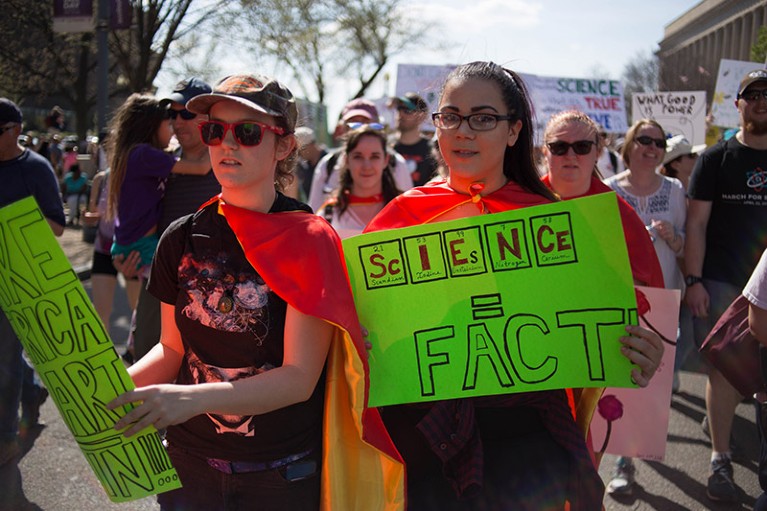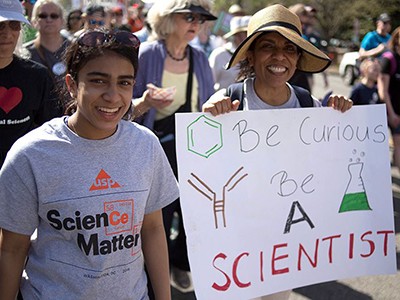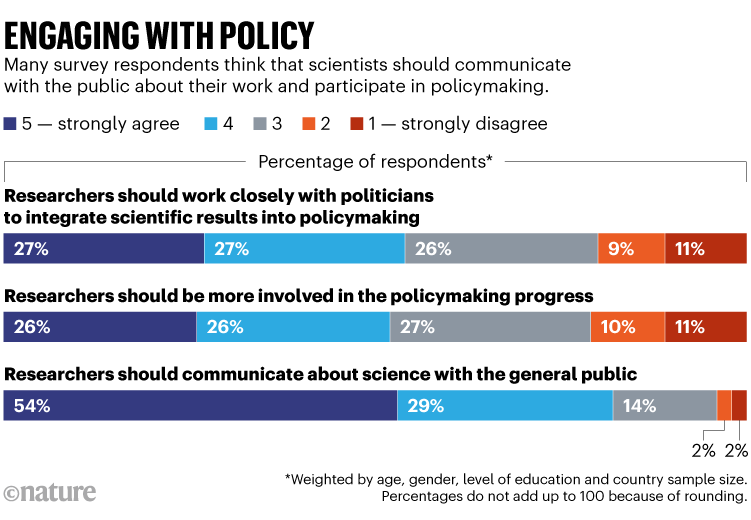
The global survey indicated that people have moderately high levels of trust in scientists overall.Credit: Michael Candelori/Pacific Press Via Zuma Wire/Shutterstock
People around the world have high levels of trust in scientists, and most want researchers to get more involved in policymaking, finds a global survey with more than 70,000 participants. But trust levels are influenced by political orientation and differ among nations, according to the study, which was described in a preprint posted online last month1.

How can scientists make the most of the public’s trust in them?
“The overall message is positive,” says James Liu, a psychologist at the Massey University of New Zealand in Auckland. “Even in the wake of the COVID-19 pandemic, which could have been highly polarizing for people’s trust in scientists, trust levels are fairly high across a range of demographics.”
“The researchers use a more robust measure of trust compared to previous studies that focus on just one or two dimensions,” says Nan Li, who studies how the public engages with science at the University of Wisconsin–Madison. “I really admired the authors’ ambitions of doing this type of study, which includes researchers from all over the world.”
The scope makes this survey one of the largest studies on trust in scientists to be conducted since the onset of the pandemic.
Worldwide attitudes
Table of Contents
Social scientist Viktoria Cologna at Leibniz University Hannover, Germany, and her colleagues surveyed 71,417 people in 67 countries. In most places, the researchers recruited participants online through marketing companies, with the exception of the Democratic Republic of the Congo, where they used in-person surveys. Respondents were asked to indicate how much they agreed with a dozen statements about the integrity, competency, benevolence and openness of scientists, on a scale of 1 to 5. A higher score indicated higher trust.

US trust in scientists is now on par with the military
Across all participants, the average trust score was moderately high, at 3.62. On a global scale, participants perceived scientists as having high competence, moderate integrity and benevolent intentions. The overall rating of openness to feedback was lower: 23% of participants think that scientists pay only somewhat or very little attention to other views. Three-quarters of people agreed that scientific methods are the best way to find out whether something is true.
Participants from Egypt had the most trust in scientists, followed by India and Nigeria; in Albania, Kazakhstan and Bolivia, people had the least trust. Participants in countries including the United States, United Kingdom, Australia and China had above-average levels of trust in scientists, whereas those in Germany, Hong Kong and Japan had below-average trust levels.
Trust and politics
The study also explored the links between participants’ trust in scientists and their political leanings. At the global level, a ‘left-leaning’ political orientation was linked to higher trust. The team saw this association at the country level in Canada, the United States, the United Kingdom, Norway and China. But out of the 67 countries surveyed, in 41 — including New Zealand, Argentina and Mexico — the team found no significant association between political orientation and trust. And in some countries, including Georgia, Egypt, the Philippines, Nigeria and Greece, left-leaning views were linked to lower trust.
“These contrasting findings may be explained by the fact that in some countries right-leaning parties may have cultivated reservations against scientists among their supporters, while in other countries left-leaning parties may have done so,” the researchers say in the preprint. For example, New Democracy, Greece’s right-wing ruling party, has since 2020 consistently cooperated with researchers in implementing a public-health agenda, which could explain why in that country a right-leaning political orientation is linked to higher trust in scientists.
“It’s about the leadership of political parties and how they treat scientists,” says Liu. The concept of a right- or left-wing political orientation can also differ among people in different countries, making it hard to interpret the findings.

Source: Ref. 1Source: Ref 1.
More than half of the respondents think that researchers should be more involved in policymaking and should work closely with politicians to integrate scientific results into policymaking (see ‘Engaging with policy’). “These results are intuitive — if people trust scientists, they will want them to be involved,” says Liu.
“But entering the public policy arena as a scientist can end up being a kind of blood sport,” he says. “We see that with, say, climate scientists being disregarded and doubted by some politicians.”
Liu thinks that there needs to be more training for scientists who want to enter policymaking, and that many researchers need to improve their communication skills, “so we’re ready for that rough and tumble arena of public policy”. The study found that 80% of people think researchers should communicate about science with the general public.
Although the study provides a general snapshot of trust in researchers, people’s trust levels will also vary depending on scientists’ fields, says Li.
The team plans to make the global data set openly accessible online, to help other researchers study the topic.
